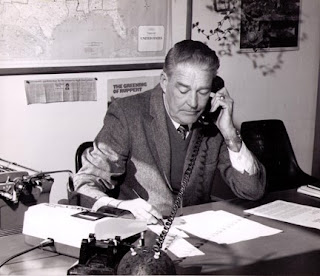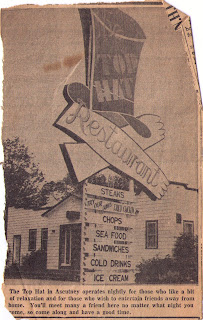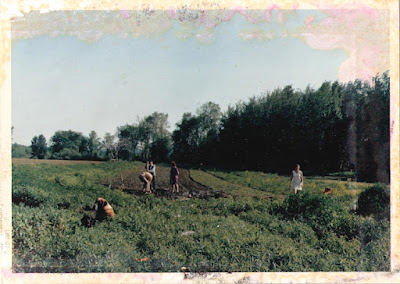BACG History Post #8
Bryson H. Thompson was born in Shelburne, Vermont on August 11, 1917. He was the youngest of four children born to Thomas M. Thompson and Alice Bryson Thompson.
During his early teen years, Bryson was an honor student at Shelburne Junior High School and a Boy Scout in the local troop. The family had a camp at Cedar Beach in Charlotte.
Following the divorce of his parents, Bryson moved to Springfield, Massachusetts in 1932 with his mother, Alice Bryson Thompson, his sister Jean, and his brother Shirll. His father remarried and remained in Shelburne.
Bryson and Jean returned to Shelburne to spend summers with their father. The elder Thompson was an insurance salesman and an active participant in community and civic affairs. He served as chair of the local school board, town constable, sheriff, fire warden, and game warden. Thompson represented the Town of Shelburne for two terms in the state legislature. He died in 1950.
After graduating from Central High School in Springfield, Mass., Bryson attended Bay Path Institute, also located in downtown Springfield. He graduated in 1938 and went to work as the terminal manager for Gay’s Express trucking company in Bellows Falls, Vermont.
Mary Siliski graduated from Springfield High School, in Springfield, Vermont. She attended Brattleboro Business Institute, which was an extension campus of Baypath Institute. She was hired as a bookkeeper at Gay's Express, where she met Bryson Thompson, who was two years older.
Bryson gave Mary a ride home from work so that she would not have to walk past a cemetery in the dark. They married in August 1942 at the Russian Orthodox church in Springfield, Vermont. Bryson was inducted into the U.S. Army a few days after the wedding. He completed basic training at Fort Devens, in Massachusetts.
During World War II, Thompson served as a cryptographic technician operating equipment used to code, decode, and transmit secret information. Since radio signals could be intercepted, the major Axis and Allied powers used complex machines to turn text into code. Breaking the German and Japanese codes was vital to predicting troop movements and protecting shipping on the high seas. Cryptography allowed President Franklin Roosevelt and British Prime Minister Winston Churchill to communicate securely.
After being discharged from the Army Air Force, Thompson worked as an accountant at Hartford Mills. In 1946, he and his wife purchased a vintage 1930s road house on Route 5, in Ascutney, Vermont. Four, Five, and six-piece groups played big band music there to large crowds. They renamed the establishment “The Top Hat Restaurant.” A lounge was added in 1949.
People came from a 40-mile radius to the popular night spot where Thompson tended bar. Though the Top Hat was the place for many happy celebrations, trouble occasionally popped up. When Thompson refused to serve an intoxicated customer on April 4. 1957, the drunken man got into a scuffle with Thompson. The man later threw rocks through the windows of the lounge causing $300 in damage.
The Thompsons owned and operated the Top Hat for 25 years. The couple sold the Top Hat, their home in Ascutney, and the Ascutney laundromat in the fall of 1971. They moved to nearby Windsor VT. Thompson became restless. He looked for something new to do.
The Thompson’s only daughter, Marilyn Leimenstoll, was an enrichment educator and community activist in Burlington. She provided professional development training for teachers working with the Follow Through Program, which was part of Head Start. The program was based at H.O. Wheeler Elementary School in Burlington’s Old North End.
In the spring 1971, Leimenstoll and the H.O. Wheeler teachers developed a curriculum that put arts and science together. They began with indoor activities with seeds and plants, then started a small outdoor garden project at the school. A summer gardening and day camp program was the next step.
Leimenstoll became friends with Alec Webb, whose father Derick Webb owned Shelburne Farms. The Webbs provided land for the summer day camp. Children and counselors were recruited from the Old North End of Burlington and surrounding towns.
Leimenstoll and Alec Webb worked together during the summer of 1971 to coordinate the camp sessions. Children were taught gardening and conservation, along with weaving, potting, dancing, and writing. Leimenstoll led four two-week teacher training courses focusing on environmental education.
The summer day camp at Shelburne Farms expanded to a family group garden project in 1972. Staff from Gardens for All, Lyman Woods' fledgling not for profit initiative, helped 15 families learn how to grow vegetables.
Wood was looking for someone to coordinate a broader community garden program. Alec Webb had met Leimenstoll's father, Tommy Thompson. Webb recommended that Thompson get in touch with Wood about the new position.
With his military training, business experience, interest in gardening, and outgoing nature, Thompson was the perfect person for the job. Known by his father's nickname, "Tommy," he began work with Gardens for All in January, 1973.


